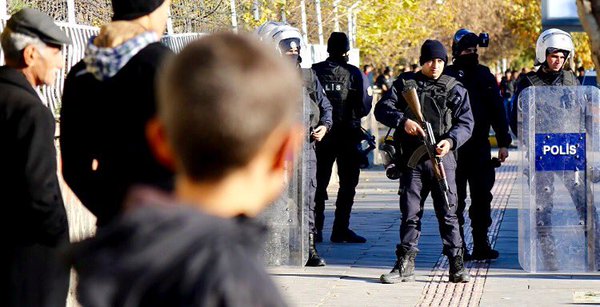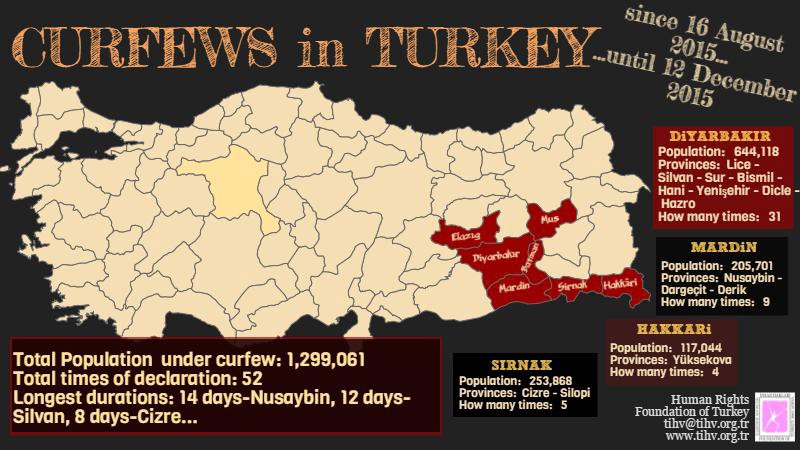About 1,100 Kurdish and Turkish academics signed a letter condemning the ongoing atrocities by the Turkish army. In response, Erdoğan accused them of treason
Authored by Francis O’Connor & Semih Celik. Published in ROAR Magazine on 1-16-2016.
“I am fine with everything except for imprisonment,” says a recently appointed Assistant Professor from one of the most prominent universities of the country, in Ankara.
“Everything happened so quickly. First, we signed the statement, the next day President Erdoğan was condemning us with the worst of adjectives, immediately after that, came the inquiries.”
His personal anxiety in the face of the latest clampdown on academics in Turkey is one example, but it is representative of the common mood among hundreds of young academics who have become part of a movement “Academics for Peace” through their signing of a statement.
KURDISH AREAS UNDER SIEGE
Since August last year, the Turkish government has imposed intermittent open-ended military curfews on an array of Kurdish cities in its campaign against young militants in the YDG-H, which is linked to the PKK. These have been dramatically scaled up since mid-December, however, when a number of cities — most notably the Sur district of Diyarbakir, Cizre, Silwan, Şırnak and Silopi — were put under military siege.
In these cities, around 200,000 civilians are trapped in what remains of their houses, in some cases for up to 30 days — many without electricity, water or even food in some places. Injured civilians have been prevented from accessing medical attention and have subsequently died of their wounds. Families have been prevented from reclaiming the bodies of their loved ones.
According to the Turkish Human Rights Foundation, the civilian death toll as of January 8 is 162 civilians, including 32 children, 29 women and 24 victims over 60 years of age. These extensive sieges involve enormous deployments of soldiers and police officers encircling urban centers before targeting them with heavy artillery, oblivious to the presence of local residents.
A CLAMPDOWN ON ACADEMICS
In light of Turkey’s flagrant disregard for both its own laws and international human rights protocols, more than a thousand Kurdish and Turkish academics signed a letter declaring that they would not pay silent witness to the ongoing atrocities. They announced: “we will not be a party to this massacre by remaining silent and demand an immediate end to the violence perpetrated by the state.”
The letter further called for an immediate end to the curfew, the presence of international monitors in the affected districts and a restoration of the peace negotiations which Erdoğan deliberately scuppered in an effort to restore the AKP’s electoral dominance last summer.
In response to the call for an end to the violence, Erdoğan decried the signatories’ ignorance, accused them of favoring colonialism and ultimately of treason. In the immediate aftermath, state prosecutors initiated legal proceeding against all the original signatories of the declaration, charging them with “propagandizing for a terrorist organization” and “overtly insulting the Turkish nation, the State of the Republic of Turkey, Grand National Assembly of Turkey, the Government of Republic of Turkey and the judicial organs of the state.” These charges can result in sentences of up to five years in prison. Twenty-two of the signatories have already been taken into custody.
In addition to these legal proceedings, the Council of Higher Education (Yükseköğretim Kurumuo, or YÖK) has vowed to take further punitive measures against the signatories. YÖK has demanded that Prof. Bülent Tanju from Abdullah Gül University in Kayseri resign, while individual university administrations — contrary to all legal protocols — have suspended or fired their own staff members, such as in the case of Professor Latife Akyüz in Düzce University.
In cities like Bolu and Kocaeli in northwestern Turkey, police have raided the houses of signatories. Incidentally YÖK was established by the military government in 1982 as a means to limit universities’ autonomy and restrict their capacity to serve as sources of opposition to the state.
A CAMPAIGN OF DEMONIZATION
In parallel to this blatant suppression of freedom of expression, a concerted media and political campaign is trying to further demonize the signatories. Turkey’s far-right MHP party has been to the forefront these efforts: one of its Istanbul deputies, İzzet Ulvi Yönter, declared that “the government should immediately take action and fight as it does in the districts of Sur, Cizre, Dargeçit and Silopi against the terrorists in universities.”
Meanwhile, other figures with links to fascist or Turkish nationalist organizations such as the criminal Sedat Peker have threatened: “at that moment, the bell will toll for you all … I would like to say it again: we will spill your blood and we will shower in it!”
This cannot be dismissed as an idle threat. Turkey has a long and shameful history of murdering intellectuals, critical academics and journalists. Calls like these are seized upon by university students of extreme right-wing political organizations like the Grey Wolves, responding with insults and threats to the signatories, mostly by marking and sticking threatening letters on their office doors promising to “make the city hell” for their own professors.
Students have also acted upon their threats by raiding their professors’ offices. Prof. Kemal İnal’s life, for instance, was directly threatened by his own colleagues. As a result, he was one of the two signatories to withdraw their signature. The threats, both from state officials and public figures, have found support among the pro-government and pro-state segments of Turkish society, contributing to the signatories’ stigmatization and leading only to further polarization.
A SENSE OF SOLIDARITY
The threats and legal measures have created a strong sense of solidarity among the academics who had signed the statement. Nearly all of the more than 1,100 signatories have declared that they stand firmly behind their words. Their efforts have been further supported by their own students in universities, and in a wave of statements of solidarity from filmmakers, journalists, publishing houses and authors.
However, given the horrendous human rights credentials of the Turkish state, anxiety caused by the inability to foresee what is awaiting them makes it harder to bear the smear campaign launched by the government and state institutions. “What is the worst that could happen?” worries one comrade who had signed the statement. The ambiguity of criminal codes and their arbitrary application since the 1990s leaves this ghastly question mark hovering in the signatories’ minds.
For a younger generation of academics who have been politicized in post-1990s Turkey, the immediate example is the unlawful imprisonment, for months, of thousands of Kurdish university students and professors, activists, journalists and members of the pro-Kurdish party under the accusation that they were members of the “civilian” wing of PKK, the KCK, in 2011.
The likelihood of spending months in prison makes losing academic positions a concern of lesser importance. Many of the affected academics who have established ties with institutions outside of Turkey maintain the possibility of fleeing abroad in order to be able to continue their professional careers in environments with a minimum breach to their freedom of expression.
Despite this gloomy and pessimistic picture, initial feelings of sorrow, weariness, fear and anxiety have been transformed into hope as a result of the ever-growing sense of solidarity. Another comrade, a research assistant from a private university in Istanbul whose contract has been suspended due to the ongoing investigations, expressed her happiness for the huge number of solidarity messages she has received in a single day.
In this light, we should consider that the ultimate outcome of the clampdown on the Kurdish activists in 2011 was broader solidarity and a better organized Kurdish movement, whose mobilization made the peace talks and the ceasefire between the PKK and the Turkish armed forces possible.
At the moment, our conversations end with a sense of hope generated by the acts of solidarity of friends, colleagues and total strangers. Solidarity remains the only force to beat the darkness that prevails in the country for more than 40 years. Another comrade reminds us the famed verses of one of the most prominent contemporary poets of Turkey, Murathan Mungan: “Our path might cross through steppes/Yet; the streets will reach the sea.”
A COLLECTIVE INTERNATIONAL RESPONSE
Tonight, thousands of brave academics, journalists and activists across Turkey are anxiously awaiting a knock at the door — a knock that could potentially escort them to years in prison or add them to the tragic list of great minds murdered for views considered impermissible by the state. Similarly, tens of thousands of civilians are cowered down in the basements of Silopi, Cizre and Sur, parents attempting to lull hungry children to sleep while being bombarded by their own government.
Emboldened by his success in the November elections, Erdoğan is determined to quell any internal opposition and to silence all voices which resist his violent authoritarianism. The Turkish state’s willful disregard of its own citizens’ well-being and rights, and its determination to punish those who refuse to remain silent in face of its atrocities, demands a collective response from international political actors, activists and civil society.
Let us collectively raise our voices and act in solidarity with our Kurdish and Turkish colleagues and comrades under threat in Turkey. Solidarity demonstrations are being organized across the globe, across Europe, North America and of course in Turkey itself. The barbarism and inhumanity of Erdoğan and his regime needs to be halted.
The world can no longer remain complicit by its silence.
About the Authors:
Francis O’Connor is a Germany-based researcher from Ireland. He completed his PhD at the European University Institute on the Kurdish struggle in Turkey.
Semih Celik is a PhD candidate at the European University Institute, department of History and Civilization.
Related Article:
Why Turkey’s government is threatening academic freedom




